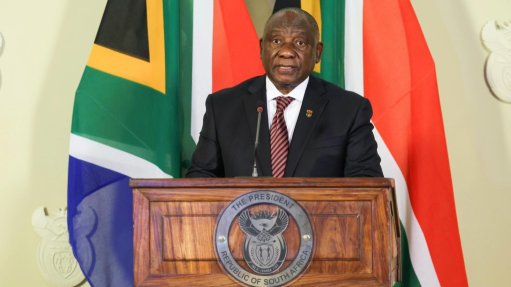Fragile unity test
We ought to give the African National Congress (ANC) props. Thanks to its political sleight of hand, the party is poised to continue its dominance of South African politics for the next five years, despite losing its Parliamentary majority for the first time since 1994 in last month’s elections.
The Democratic Alliance (DA), its long-time adversary, is now part of government and has distanced itself from fresh attempts to have President Cyril Ramaphosa impeached over the Phala Phala saga – where he was accused of wrongdoing concerning the sale of cattle at his farm of the same name – unless new evidence emerges. With the combined Parliamentary representation of the ANC, the DA and a few smaller parties in the new government of national unity in the upper sixties in percentage terms, it looks set to be plain sailing for the former liberation movement until the next elections.
What this implies is that, however loudly the ANC’s – and Ramaphosa’s – remaining adversaries, Jacob Zuma’s uMkhonto we Sizwe Party and Julius Malema’s Economic Freedom Fighters, may call for the President’s removal, their chances of success are minimal. The ANC’s and its new partners will unite to push back against such attempts, leveraging their combined majority.
On paper, this ensures a stable government, reducing the likelihood of the dramas seen in municipalities such as Ekurhuleni, Johannesburg, Nelson Mandela Bay and Tshwane since South Africa lurched onto the coalition government terrain at municipal level in 2016.
But will this government last the full five years?
This is a difficult question, primarily because coalition governments are inherently fragile alliances that rely on a delicate balance of power sharing and compromises where the partners must navigate the intricacies of this type of government while safeguarding their own interests.
For the new government to succeed, the partners must be able to transcend their narrow, short-term interests. But, as history has shown, this is easier said than done. I will cite three examples – Greece, Germany and Italy – to illustrate my point.
From 2015 to 2019, Greece was led by a coalition government in which the leftist Syriza party was the leading partner. This period coincided with the Greek debt crisis, which saw the country miss a €1.6-billion payment to the International Monetary Fund in 2015, making it the first developed nation to have missed such a payment.
Differences over economic policies and reforms led to the collapse of the Greek coalition government, highlighting the fragility of such alliances under economic strain. One hopes South Africa’s economy does not worsen substantially over the next five years, considering the differing economic stances of the two main parties in the new South African coalition government – the DA and the ANC.
Germany also provides a useful case study on the difficulty of running a coalition government. For a long time, the country was run by a coalition between former Chancellor Angela Merkel’s Christian Democratic Union (CDU) and the Social Democratic Party, but the partners would occasionally clash on issues ranging from immigration to energy policy. Such clashes sometimes led to delays in policy decision-making, often testing the cohesion of the coalition.
Indeed, commentators say the shift to the current set-up where Germany is run by a three-party coalition government involving the CDU, the Greens and the Free Democratic Party is an effort to balance diverse ideological perspectives.
Meanwhile, Italy has had 68 governments since the Second World War, an average of a new Cabinet every 13 months. This high turnover is attributable to the challenges of coalition politics in a diverse political landscape.
Article Enquiry
Email Article
Save Article
Feedback
To advertise email advertising@creamermedia.co.za or click here
Announcements
What's On
Subscribe to improve your user experience...
Option 1 (equivalent of R125 a month):
Receive a weekly copy of Creamer Media's Engineering News & Mining Weekly magazine
(print copy for those in South Africa and e-magazine for those outside of South Africa)
Receive daily email newsletters
Access to full search results
Access archive of magazine back copies
Access to Projects in Progress
Access to ONE Research Report of your choice in PDF format
Option 2 (equivalent of R375 a month):
All benefits from Option 1
PLUS
Access to Creamer Media's Research Channel Africa for ALL Research Reports, in PDF format, on various industrial and mining sectors
including Electricity; Water; Energy Transition; Hydrogen; Roads, Rail and Ports; Coal; Gold; Platinum; Battery Metals; etc.
Already a subscriber?
Forgotten your password?
Receive weekly copy of Creamer Media's Engineering News & Mining Weekly magazine (print copy for those in South Africa and e-magazine for those outside of South Africa)
➕
Recieve daily email newsletters
➕
Access to full search results
➕
Access archive of magazine back copies
➕
Access to Projects in Progress
➕
Access to ONE Research Report of your choice in PDF format
RESEARCH CHANNEL AFRICA
R4500 (equivalent of R375 a month)
SUBSCRIBEAll benefits from Option 1
➕
Access to Creamer Media's Research Channel Africa for ALL Research Reports on various industrial and mining sectors, in PDF format, including on:
Electricity
➕
Water
➕
Energy Transition
➕
Hydrogen
➕
Roads, Rail and Ports
➕
Coal
➕
Gold
➕
Platinum
➕
Battery Metals
➕
etc.
Receive all benefits from Option 1 or Option 2 delivered to numerous people at your company
➕
Multiple User names and Passwords for simultaneous log-ins
➕
Intranet integration access to all in your organisation

















